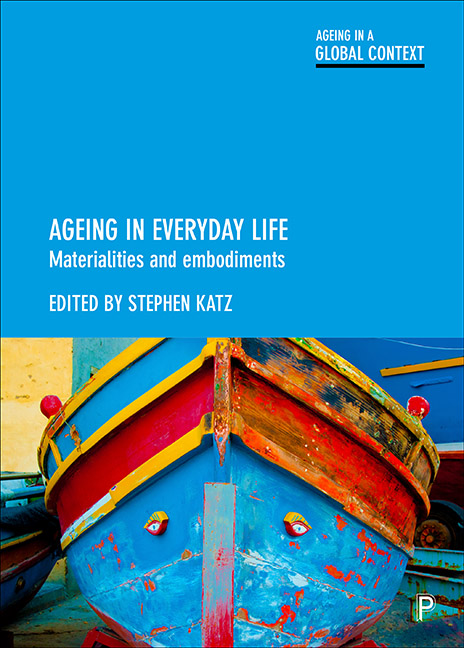Five - What’s exotic about The Best Exotic Marigold Hotel? Cinema, everyday life and the materialisation of ageing
Published online by Cambridge University Press: 22 April 2022
Summary
“Drama is life with the dull bits cut out.” (Hitchcock, 1960)
With its proclivity to indulge in escapist fantasies, fiction film may seem diametrically opposed to local realities of everyday life. As Alfred Hitchcock (1960) intimates when he describes drama as “life with the dull bits cut out”, many people make and watch movies to indulge in youth-obsessed images far from laundry, feeding, bathing, medicating, exercising, aching and deciding where and how to live, topics that dominate understandings of the everyday life of old age. Yet movies have the capacity to portray the commonplace aesthetically, rendering it both palpable and imaginative. Film can, as Heike Klippel (2014) puts it, ‘materialize … make visible and tangible, the “fiber” out of which [contemporary] forms of life are woven’. This is one reason why cinema belongs in a book about ageing and everyday life: when films focus on late life, they have trouble avoiding what too often are thought to be the ‘dull bits’ of life, so they have potential to make the dull extraordinary in constructive and destructive ways.
The cinema also matters for this book about ageing and everyday life because film has weathered multiple technological transformations – from theatre to television to tape to disc to streaming – so that it is continually and increasingly incorporated into everyday practices of cultural consumption. In late 2015, Sandvine reported that Netflix alone accounts for over one third of internet traffic in North America, indicating that North Americans are highly engaged in watching television and film daily. Lakshmi Srinivas (2005) explains, speaking of Bombay cinema, that ‘media are powerfully involved in the global circulation of images and messages while at the same time being part of the fabric of everyday life’ (pp 323-4). Thus, cinematic representations of older adults circulate influential conceptions of ageing. And those images affect and participate in everyday life.
The silvering screen
Since the turn of the last century, a new wave of movies that put older adults at their centre has appeared on large and small screens, something I have called ‘the silvering screen’ (Chivers, 2011). Such films feature older actors playing older characters who portray as everyday some aspects of ageing – such as having older, creakier joints – and portray as exceptional and horrifying other aspects of ageing – such as becoming disoriented due to dementia.
- Type
- Chapter
- Information
- Ageing in Everyday LifeMaterialities and Embodiments, pp. 83 - 98Publisher: Bristol University PressPrint publication year: 2018



